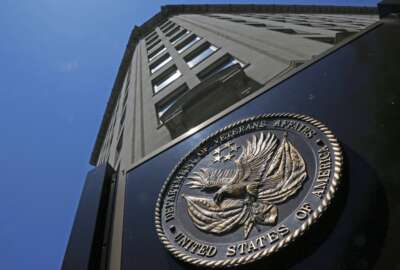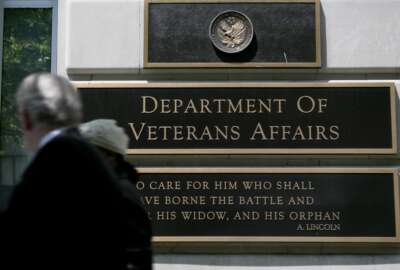

The Department of Veterans Affairs' hiring metrics are headed in the right direction, as the agency looks to staff up on healthcare workers to meet its growing...
The Department of Veterans Affairs’ hiring metrics are headed in the right direction, as the agency looks to staff up on healthcare workers to meet its growing workload.
The Veterans Health Administration added more than 5,550 additional employees to its workforce in the first quarter of FY 2023 — resulting in a 1.5% growth rate in its workforce for the quarter.
VA’s Chief Nursing Officer Christopher Saslo told reporters last week that’s the agency’s highest first-quarter growth rate in six years. Saslo attributed some of the improved hiring numbers to VHA’s onboarding surge event in November 2022.
The VA is looking to replicate those results on the benefits side of the agency. The Veterans Benefits Administration is holding its own onboarding surge event this week.
“Nothing is more critical to our success than the people we hire and retain at VA,” VA Secretary Denis McDonough told reporters on Jan. 31.
The VHA onboarded a total of 4,345 new employees in December 2022 — a record for onboarding in December and 87% higher compared to the same period in previous years.
First-quarter hiring was particularly strong for registered nurses, medical support assistants and social workers. VHA also brought on a significant number of licensed practical nurses and nursing assistants.
“Although I am happy to see positive growth for [licensed practical nurses] and [nursing assistants], we are still far from where we need to be to meet our hiring goals over the next four years,” Saslo told reporters.
Each year over the next four years, the VHA needs to hire over 10,000 registered nurses, 1,800 LPNs and 2,400 NAs. This level of hiring is needed to meet projected growth and cover the VA’s rate of attrition.
These hiring goals, however, do not take into account the VA’s need to hire additional nurses in order to implement the Promise to Address Comprehensive Toxics (PACT) Act, the burn-pit toxic exposure health care bill that passed last summer.
The VA treated 6.7 million patients in 2022, but the PACT Act is expected to bring an additional 3.5 million veteran into VA care over the coming years.
The VA has received more than 278,000 PACT Act-related claims since last August and has granted more than 33,266 of those claims so far.
The VA is the largest employer of nursing personnel in the U.S. with more than 113,000 nurses. Almost 14% of the VA’s nursing workforce are veterans.
The VA saw its hiring numbers trend in the right direction starting last summer, when its hiring rate for nurses surpassed its rate of attrition for the first time since the start of the COVID-19 pandemic. The agency saw a net gain of 2,000 nurses to its workforce in fiscal 2022.
Kelly Irving, the head of nursing at the Michael E. DeBakey VA Medical Center in Houston, said the VA’s nurses have gone through a lot since the start of the COVID-19 pandemic.
“Oftentimes, they’re tired of me asking them to do things and to step up and to raise the bar and to move forward — but yet they do. COVID was one of those times for us. I can tell you the nurses in our organization, they exude compassion and out-of-the-box thinking. We ensure that every veteran that entered, we could take care of them and we could take care of them safely, while still taking care of each other,” Irving said.
While the VA has been trying to stay ahead of its rate of attrition, Irving said the agency is starting to rehire some nurses who left the VA for jobs in private-sector health care.
“We may have lost a few nurses, but I’m here to tell you, they came back,” Irving said. “They left for the private sector and many of them have returned. We were able to compete with the private sector and that is because we have an environment of inclusion. We have an environment where there is a commitment to taking care of our nation’s heroes.”
Irving said there are still some hurdles VA is looking to address. The VA is looking to compete with the private sector’s time-to-hire, which can be around 30-45 days.
“We do a rigorous onboarding process. It does take us longer, so we have to stay engaged with the applicants. That is one of our challenges, but otherwise, we’re hiring people on a regular basis,” Irving said.
McDonough said the VA, in some cases, is taking 90-120 days to onboard medical personnel.
“It’s too slow,” McDonough said, adding that the VA is in talks with the Office of Personnel Management on how to address its lengthy time to hire. “We control that, we should fix that.”
The VA is also looking to Congress for additional pay flexibility for health care workers to keep its hiring momentum going.
McDonough said the VA supports the VA CAREERS Act, last month by Senate VA Committee Chairman Jon Tester (D-Mont.) and Sen. John Boozman (R-Ark.). The bill would set higher base pay caps for VA physicians, podiatrists, optometrists and dentists.
McDonough said the VA is “not competitive” in hiring some specialist providers at the current $400,000 salary cap. He added that VA medical centers sometimes wind up spending more on contracted specialists, rather than hiring them full-time.
“I’ve heard from different VISN leadership that there are VISNs where we’re spending [$1.2] million to get access to that specialist, even as we could have hired that person for far less,” McDonough said.
The VA is also looking to Congress for a legislative fix to maintain its expanded use of telehealth tools.
President Joe Biden’s plans to end the national emergency declarations that have been in place since the start of the pandemic would disrupt the VA’s ability to schedule telehealth appointments and prescribe drugs to veterans living in different states than their providers.
“Because of the dramatic increase in telehealth, it’s meant that we’ve been able to maintain access to a lot of vets,” McDonough said. “This ability to renew prescriptions over state lines is something we badly need to ensure that we can continue, once the national and public health emergencies related to the pandemic expire.”
McDonough said the VA is asking for action from Congress before these emergencies end “to ensure that veterans receive the same level of access and high-quality care that they deserve.”
Copyright © 2025 Federal News Network. All rights reserved. This website is not intended for users located within the European Economic Area.
Jory Heckman is a reporter at Federal News Network covering U.S. Postal Service, IRS, big data and technology issues.
Follow @jheckmanWFED


